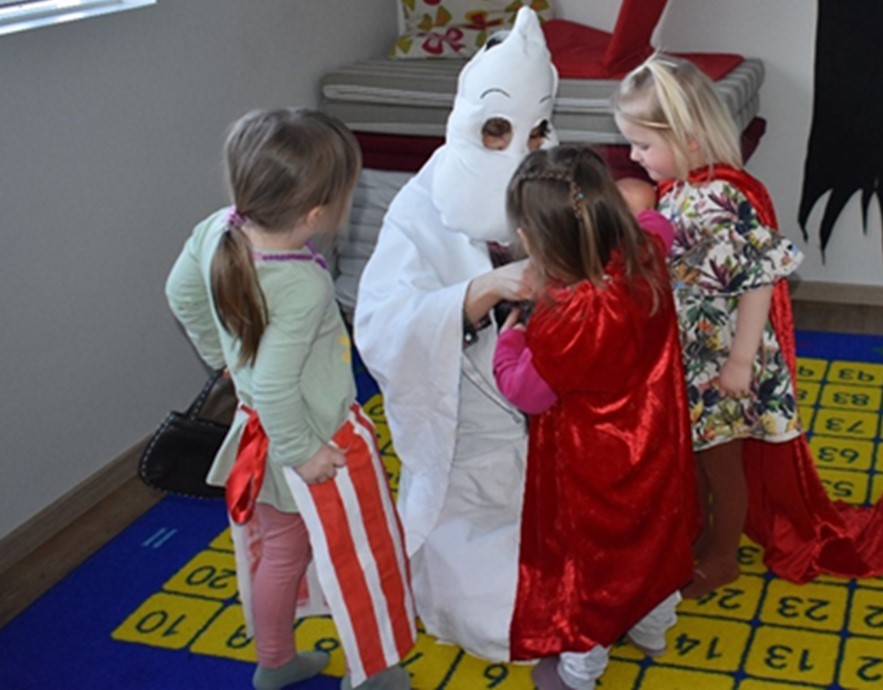EECERA Conference 2025 – Guest Blog # 12: Reclaiming Play as a Site for Social and Ethical Learning
Posted 10th August 2025
One of a series of short blog posts by presenters who will be sharing their work at the upcoming annual conference in Bratislava, Slovakia. Any views expressed in this post are those of the author(s) and do not necessarily reflect the official stance of their affiliated institution or EECERA.
Adult–Child Play and Social Sustainability in Icelandic and Swedish Preschools
By Anna Magnea Hreinsdóttir (University of Iceland, Iceland), Eva Hallgren (Stockholm University, Sweden), Robert Lecusay (Stockholm University, Sweden), Angelika Hatlevoll, Kristine Rende, Auður Ævarsdóttir, and Kristín Hildur Ólafsdóttir

Reclaiming Play as a Site for Social and Ethical Learning
At the 2025 EECERA Conference in Slovakia, our symposium, Adult–Child Play and Social Sustainability in Icelandic and Swedish Preschools, brings together two years of cross-national collaboration exploring how imaginative role play and drama pedagogy can serve as catalysts for inclusive, socially sustainable early years education.
Funded by the Erasmus+ programme, this joint project involved educators and researchers from Sweden and Iceland who co-designed and enacted Playworlds: creative, narrative-driven play formats inspired by children’s literature. Our work draws on Gunilla Lindqvist’s (1995) concept of the Creative Pedagogy of Play and invites both children and adults to step into fictional worlds where ethical dilemmas, cultural tensions, and social emotions are explored together.
The Playworld Method: Where Drama Meets Democracy
A Playworld is more than a story reenactment. It’s a co-created dramatic world in which adults and children take on roles, improvise scenarios, and build meaning together. This practice uses the aesthetic and structural tools of drama—narrative tension, fictional space, symbolic transformation—to create a playful, yet emotionally resonant learning environment.
Adults become characters in the play alongside children, challenging traditional power dynamics and making space for shared exploration. Educators report that this leads to deeper relationships, increased inclusion, and new perspectives on children’s strengths and identities.
A Tale of Two Contexts: Sweden and Iceland
In Sweden, where curriculum reforms (LPFÖ 18) have redefined teaching and learning in ECEC, educators face a growing tension between play as exploration and play as a learning strategy. Our symposium shares how Swedish preschool teachers, supported by drama education researchers, have used Playworlds to re-centre the role of play in a more holistic, relational, and socially responsive pedagogy.
In Iceland, where play has long been central to early years practice, the collaboration provided opportunities to reflect on how the active role of adults in role play could further support children’s well-being and belonging. Educators in both countries selected shared children’s books and designed role-play scenes that were enacted across partner preschools during exchange visits.
Key insights from both contexts include:
- Adults’ role-taking increases child engagement and inclusion.
- Playworlds support emotional literacy, empathy, and perspective-taking.
- Principals observed increased job satisfaction and collaboration.
- Children practiced conflict resolution, narrative competence, and autonomy.
Drama as a Lens for Research: Linking Play and Social Sustainability
Beyond practice, this symposium also presents empirical findings from our design-based research, which analyzed documentation and reflections from four preschool exchanges. We focused on how drama pedagogy helped teachers articulate and navigate the links between play and social sustainability.
Core findings include:
- Educators intuitively use dramatic methods, like roles, tension, and narrative, despite limited formal drama training. Due to growing drama awareness, how to use the drama tools, the educators gradually became more immersed in the play through role-taking.
- Playworlds create a hopeful, improvisational form of agency (Hallgren, 2018) that nurtures children’s capacity to imagine and enact better social futures.
- Organizational support and leadership are key enablers of sustained, meaningful play.
- Social sustainability becomes visible in children’s growing sense of belonging, inclusion, and ethical engagement with peers.
What Can EECERA Audiences Expect?
Attendees of this symposium will gain:
- A clear theoretical overview of Playworlds, drama pedagogy, and social sustainability in ECEC.
- Case studies from Icelandic and Swedish preschools, with practical strategies and staged examples.
- Research-based insights into how educators make sense of, and shape, play as a site of cultural and relational meaning-making.
- Reflections on the professional development and structural support needed to sustain this kind of practice.
The study will be presented in Symposium Set C on Wednesday, 27th August at 8:30 – 9:50. This symposium is particularly relevant for early childhood researchers, teacher educators, curriculum developers, and preschool leaders interested in the transformative potential of adult–child co-play. It invites us to rethink play not just as the main way of learning, but as a shared cultural practice that can build more inclusive, ethical, and joyful educational communities.
Contact details: Anna Magnea Hreinsdottir, amh@hi.is – University of Iceland
Anna Magnea Hreinsdóttir will present work referred to in this blog in Symposium Set C (Wednesday, the 27th of August). (Schedule liable to change; please refer to final programme for details).
